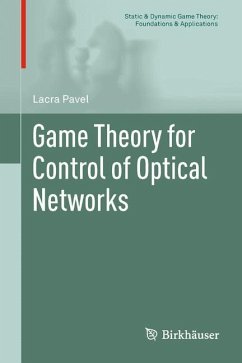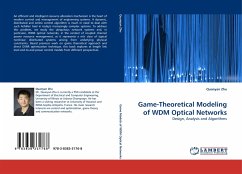Optical networks epitomize complex communication systems, and they comprise the Internet's infrastructural backbone. The first of its kind, this book develops the mathematical framework needed from a control perspective to tackle various game-theoretical problems in optical networks. In doing so, it aims to help design control algorithms that optimally allocate the resources of these networks.
With its fresh problem-solving approach, "Game Theory for Control of Optical Networks" is a unique resource for researchers, practitioners, and graduate students in applied mathematics and systems/control engineering, as well as those in electrical and computer engineering.
With its fresh problem-solving approach, "Game Theory for Control of Optical Networks" is a unique resource for researchers, practitioners, and graduate students in applied mathematics and systems/control engineering, as well as those in electrical and computer engineering.
From the reviews:
"This is a textbook summarizing current research on game theoretic models for control of optical networks. ... The book is a very clear exposition of a very active research area and brings the reader close to state-of-the art. It does a very good job of highlighting the role of game theoretic techniques, often presenting more than one approach or algorithm for a problem, and ... it can be used to advantage by an interested researcher without prior exposure to familiarize herself with the broad area." (Vivek S. Borkar, Zentralblatt MATH, Vol. 1242, 2012)
"This is a textbook summarizing current research on game theoretic models for control of optical networks. ... The book is a very clear exposition of a very active research area and brings the reader close to state-of-the art. It does a very good job of highlighting the role of game theoretic techniques, often presenting more than one approach or algorithm for a problem, and ... it can be used to advantage by an interested researcher without prior exposure to familiarize herself with the broad area." (Vivek S. Borkar, Zentralblatt MATH, Vol. 1242, 2012)









